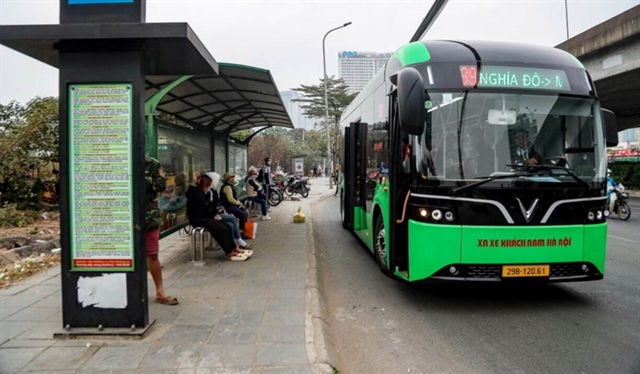 Society
Society


|
| The first Hà Nội's electric buses ran by Transerco were put into operation on January 18. Photo baotintuc.vn |
HÀ NỘI – Bus companies are actively calculating and making efforts to implement the roadmap and targets for converting Hà Nội's bus fleet to green energy vehicles.
However, in addition to planning sufficient and synchronised power supplies for charging stations, the companies hope for mechanisms and policies to support the green transition and access to loan sources.
The current policy for developing a public transport system using electric and green energy buses in Hà Nội is that all vehicles must use these energy sources by 2035.
From 2026 to 2035, the city will convert 50 per cent of the fleet to electric and the remaining 50 per cent to LNG/CNG (liquefied natural gas).
The total number of buses which need to be converted is 2,051.
The city plans to convert 103 vehicles to electric buses this year alone, five percent of the fleet. Between 2026 and 2030, a further 1,813 buses (93.4 per cent) will be converted, including 859 electric buses and 851 LNG/CNG buses. All conversions should be completed by 2035.
Thus, Hà Nội will achieve its green bus target 15 years ahead of the Prime Minister’s directive outlined in Decision No. 876/QĐ-TTg, which approved the Action Programme for Green Energy Transition and Carbon and Methane Emission Reduction in the Transport Sector, with a view to achieving 100 per cent by 2050.
In terms of conversion methods, starting early this year, the four transport companies of Hà Nội Transport Corporation (Transerco), Newway Joint Stock Company, Hải Vân International Transport Joint Venture and Bảo Yến Tourism Services Construction Co., Ltd. will introduce a pilot scheme across five electric bus routes with 76 vehicles, including 11 small buses and 65 medium-sized ones in order to develop cost norms.
Additionally, for bus routes with contracts expiring in 2025, large diesel buses will be converted to large electric buses.
According to calculations by the relevant authorities, to achieve the 'green bus roadmap', Hà Nội will need about VNĐ48,625 billion (US$1.91 billion), of which the city's budget will cover VNĐ35,996 billion ($1.41 billion) and businesses need VNĐ12,629 billion ($500 million) for purchasing vehicles, partial interest payments and investing in charging stations.
Pilot bus routes lined up
Hà Nội has tasked the city’s Development Investment Fund to support businesses in transitioning to electric buses.
For the pilot, Transerco has been assigned three routes, 05, 39 and 47. While waiting for policy adjustments, Transerco has proactively invested in the pilot electric bus and charging station infrastructure for these routes using its resources.
In recent months, Transerco’s subsidiaries have actively coordinated with specialised departments, Hà Nội’s Traffic Management Centre and related units to prepare for the start of this pilot electric bus operation on January 17.
Maximising loan support
Transerco has requested sector-wide guidance on mechanisms and policies to achieve effective electric bus pilot operations, urging early economic-technical norms and price benchmarks for both medium and small buses.
Given the significant investment needed in vehicles and infrastructure, Transerco proposes loan interest support for large-scale deployment in accordance with the project reported to the Hà Nội People’s Committee.
“The corporation will balance resources, seize opportunities to enhance business development in the directions of green and digital transformation, ensuring efficiency and sustainability,” said a Transerco representative.
“We will continue to optimise our organisational structure, streamline operations and develop high-quality human resources to improve operational performance,” he said.
Phạm Đình Tiến, Head of Operational Planning at Hà Nội’s Traffic Management Centre, said that to support businesses, cost norms will be established for green energy buses, along with unified standards for service provision management to ensure consistency.
According to Nguyễn Mạnh Quyền, vice chairman of Hà Nội’s People’s Committee, the city has instructed the Development Investment Fund to expedite procedures to disburse funds to businesses.
Meanwhile, the Department of Transport and the Department of Finance have been tasked with finalising procedures to submit to the People’s Council in its next session.
“The green transformation goal is to switch to electric buses rather than using natural gas,” Quyền said.
Based on international experience, Hà Nội has requested relevant ministries and departments to consider adjusting policies to encourage investment in green buses and charging infrastructure. This includes prioritising electricity pricing for electric vehicle charging systems and issuing standards for charging stations.
Further incentives for electric vehicle taxes, import duties on components, special consumption taxes, registration fees and land lease charges for charging stations have also been proposed. VNS



.jpg)
